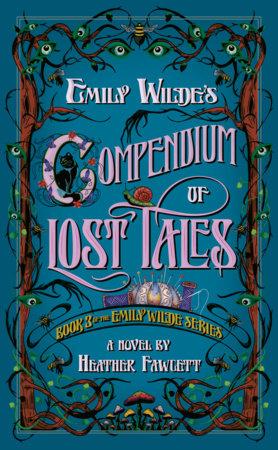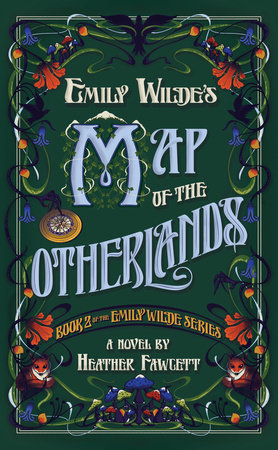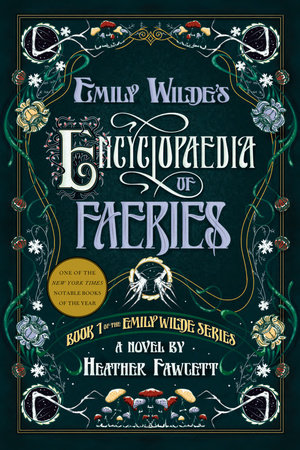Excerpt
Emily Wilde's Compendium of Lost Tales
29th December 1910—cont’dIf there is one subject upon which Wendell and I will never agree, it is the wisdom of attempting to drag a cat into Faerie. Even if said animal is a faerie cat; even if we are merely returning her to the world whence she came, still it is the most frustrating process. Wendell and I had lost Orga twice already while navigating the rocky Greek coastline, as she went charging off after mice or gulls, and now, as we stood at long last at the threshold of Wendell’s door, she had vanished again.
“Bloody thing needs to be leashed,” I said, out of spite more than anything. I strongly suspected that if I approached Orga with anything resembling a harness, it would end with me wearing the cat on my head, likely with unfavourable results where my facial features were concerned.
Shadow was at my side, as usual, his snout buried in the fragrant coastal grasses, snuffling busily. He would never abandon me as Orga is so often abandoning Wendell. Dogs are proper companions, not the physical manifestation of caprice.
Wendell made no reply. He had gone still upon first sight of the door, so much so that he might have been some gilded illustration in a storybook, except that his cloak billowed at the hem, stirred by the salt breeze, which also tugged at the golden hair falling into his eyes.
I touched his arm, and he came back to himself, turning to smile at me.
“Em,” he said, “she is a cat. You might as well expect Shadow to disregard your will as assume Orga to be governed by it. Remember her nature.”
“Her malicious, untrustworthy nature,” I said. Naturally the cat reappeared a heartbeat later, as if to spite us both, golden eyes glittering against her black fur, which rippled strangely, like smoke trapped within cat-shaped glass. Shadow, seated by my feet, gave her a weary sort of look and made his usual overture of friendship, nudging Orga gently with his nose. She arched her back and hissed.
“You should give up, dear,” I told him, but the poor dog only looked at me blankly. Shadow’s world was one in which all and sundry either fawned over him or kept a respectful distance from his intimidating bulk. Each time Orga hissed at him, Shadow seemed to assume it a misunderstanding, which grew increasingly improbable as these incidents accumulated, but still less improbable, in his view, than being disliked.
Wendell had gone back to staring at the door—savouring the moment, I suppose. I wondered if he would give a speech or something—after all, he’d spent more than a decade searching for the thing, and now here it was, folded snugly against the hillside like the bow on a Christmas gift.
I tapped my foot against a rock, feeling rather smug. Well, it had taken me only a handful of months to track the door down, hadn’t it? I’d learned Wendell was looking for a door to his realm in November of last year when we were in Ljosland, and I’d begun researching the question in earnest in March, not long after we returned to Cambridge. And now—after a few twists and turns in Austria—here we were.
I considered and discarded several quips to this effect before deciding it would not be very magnanimous of me, and merely noted, “It’s a pair with the one in St. Liesl.”
Indeed, the door before us was nearly identical in shape and style—it blended into the Greek countryside perfectly, its wooden boards painted with a scene of pale, pebbly stone and sun-dried vegetation. A little patch of rock roses to the left continued into the painting, and these two-dimensional blooms tossed their heads in the breeze in time with their tangible brethren. Even more impossible, to my mortal eyes, was the doorknob, a square of glass enclosing a splash of turquoise sea. This nexus is truly the most peculiar variety of faerie door I have encountered in my career.
1. Unfortunately, my paper on the subject—currently under consideration by the
British Journal of Dryadology—is still held up in peer review. It seems many scholars are not yet willing to accept the existence of faerie doors that connect multiple places, and it is possible that I shall have to gather additional evidence to override the skeptics, or perhaps convince other scholars to venture to Austria themselves to test my findings.
Though I’d expected to find it here, one can never be certain of faerie doors, and there was relief mixed into my self-satisfaction.
I turned to scan the landscape, shading my eyes against the sun. It was my preference not to suddenly vanish from sight in view of observers, simply because it was easier that way—Wendell and I did not need any well-intentioned search parties following us into Faerie. Beyond a little salt-stained grove of cypress trees, the land stretched out in a series of pale commas that embraced a sea so blue it made my eyes water. A pair of two-legged specks moved across a bend of sand in the distance—that was all. The countryside was empty but for us and the wind.
“How will they follow us?” I said, trying to hide my trepidation.
“Oh—easily enough,” Wendell said absently. And he reached out with uncharacteristic hesitation and turned the knob.
We stepped through together, Wendell’s hand closing around mine. I did not need his help, as I’d ventured through a few such impossible doors in my day without faerie aid, but I knew this was not his reason. His hand trembled lightly. I laced our fingers together and tightened my grip.
The little cottage beyond the door was empty, thank God—the winter faerie who owned it was now roaming the countryside, revelling in the delights of his season, as Wendell said such Folk were wont to do. The floor had been swept and the dishes in the washbasin put away, and overall everything had a very tucked-in, tidy look about it, as one might leave a home before a prolonged absence. I kept my gaze away from the mantel and the faerie’s gruesome “art.”
Orga and Shadow had followed behind us, Shadow giving the door a curious sniff before entering, but otherwise showing no sign he viewed this as any different from stepping through the door of my office at Cambridge. Wendell allowed it to close behind us, and we gazed at the row of six doorknobs on the inner side.
I wanted to ask him about those doorknobs—specifically, I wanted to investigate them further, as two were a complete mystery to me and I wished to know where they led—but I knew it was not the time. His fingers drifted past the knob that would open the door to the Peloponnese again—which was now at the top—and past the one for the Austrian Alps. This one had a large key in it that looked to be made from bone. Locked.
Wendell clicked the lock open—I pictured the little door shimmering into existence once more against the Alpine mountainside—then removed the key and set it on the table. He lingered briefly on the doorknob decorated with a floral pattern before returning to the one covered in moss, which was now in the middle, for some reason. It had been lowest in the row when Ariadne and I had passed through the winter faerie’s house in October. Wendell pushed the door open.
Light.
It was full morning, and my vision flooded with colour. Primarily green, but there was also the yellow of moss and lichened stone, the violet of bluebells clustered at the edge of the forest, the gold of sunbeams, and the rich azure of the sky. The door opened onto a hill in a small clearing, beyond which a wall of trees nodded their boughs in the wind, as if in greeting. The air was wet from a recent rain and heavy with the smell of green and growing things—all as I remembered.
Wendell pressed my hand to stop me from moving forward. His eyes followed Orga as she sniffed the air and then paced into the open. Her ears were pricked, alert, but the tension quickly left her body, and she sat back to nibble at a stalk of grass.
“I thought my stepmother might have this door watched,” Wendell murmured. “If she lived.”
“Or she might have sealed it,” I agreed. “But then there is no reason to think she knew how Ariadne and I escaped, unless one of the common fae took note of our flight and told her.”
Wendell nodded, but still he stood hesitating on the threshold. He looked pale and strangely young against the shadow of the winter faerie’s home; he put me in mind of a nervous child hesitating behind a stage curtain, unwilling to emerge when his cue came.
I stepped into the sunlight, a welcome change from the dank chill of the winter faerie’s house. A little shudder went through me, though whether it signified terror or excitement, I could not tell. A part of me wonders if my fear of Wendell’s kingdom, instilled by the many dark and unpleasant stories I have read of it throughout my career—not to mention my experiences here previously, which have faded into half-memories with the aura of nightmares—will ever fully leave me.
I gave his hand a playful tug. He looked at me, still pale, but something in my face seemed to steady him, and he allowed me to pull him through the door.
He took a few steps and then suddenly sank into a crouch, burying his face in his hand. Orga established herself at his feet, facing the forest warily. Shadow gave her what I can only describe as an approving look.






